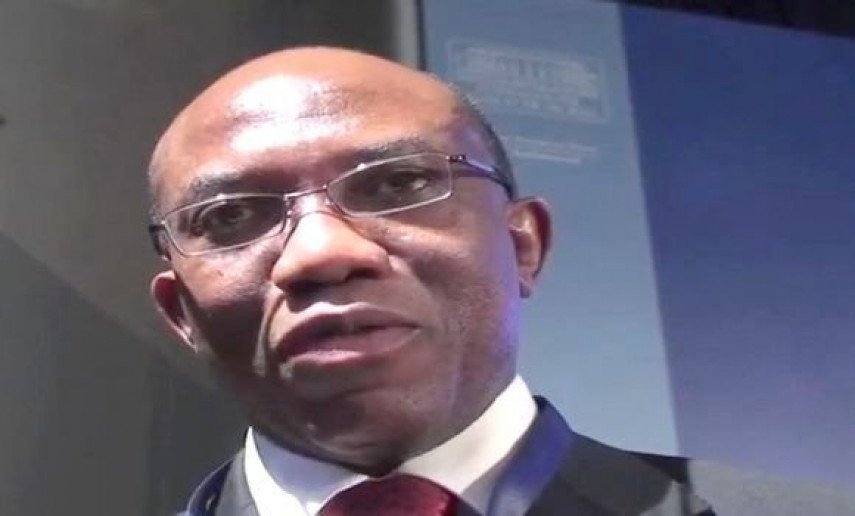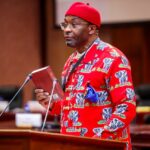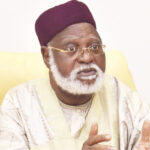Ambassador Bankole Adeoye, was until recently Nigeria’s envoy to the African Union. He was elected Commissioner of the Political Affairs and Peace and Security Department of the AU Commission on February 7, 2021, the only candidate to get the votes of all the 55 member countries in the election. He is the first person to head the department following the merger of Political Affairs and Peace and Security Department under a recent reorganization of the Commission. In this interview, the first since his election, he told Daily Trust Saturday that his vision is to promote democracy and security across the continent. Excerpts:
What challenges do you see in managing them?
Indeed, I am not oblivious of the enormous task ahead, especially with the merging of the two departments, Political Affairs and Peace and Security, as an integral part of the restructuring of the AU Commission. However, what I see is more of opportunities than challenges – the opportunity for an integrated approach and synergy to build a peaceful, secure and more democratic Africa, with good governance as the crosscutting theme.
A number of countries are still experiencing internal crises – DR Congo, Central African Republic, Mozambique, Mali etc. How do you intend to approach these issues with a view to resolving them?
A conflict-free Africa demands that the AU invests in the tools of preventive diplomacy using the pragmatic approach to address new, emerging and specific existing threats. There are a number of approaches we intend to deploy in this regard. One of which is to overhaul the operations of conflict-prevention mechanisms in the AU, for desired results through the pivotal roles of AU Peace and Security Council (PSC), Panel of the Wise, AUC Mediation & Dialogue focus, Master Roadmap on Silencing the Guns and the revitalized AU Peace Fund. This of course, should be situated in the desire to scale up collaboration with relevant Regional Economic Communities (RECs) and Regional Mechanisms (RMs) such as ECCAS, ECOWAS, IGAD, Lake Chad Basin Commission etc, to constantly engage relevant parties and stakeholders, towards resolution of the conflict. Not forgetting involving the good offices of the Chairperson of the AU and that of the Commission, in harmony to make peace happen. The interface between the AU, RECs and RMs would be beneficial to the vision of a peaceful and secure Africa.
There has also seemed to be a setback in the democratization process in the continent with a number of leaders either extending their tenures or refusing to allow for a free and fair election. What is your reaction to that?
The African democratic landscape remains positive, laden with the potential for democratic progress and consolidation. A number of elections were successfully conducted in 2020 despite the COVID-19 pandemic while over 20 parliamentary and presidential elections are billed for 2021. Certainly, the democratic trajectory for the continent is increasingly inclusive and more participatory. However, a key pillar of my vision as Commissioner PAPS, is to promote the strengthening of Democracy and Good Governance on the continent for Human Security to thrive.
Undoubtedly, democracy is a process and not an event – Thus a fully democratic Africa is possible and imperative to bring about lasting peace on the continent. Therefore, we plan to leverage on the veritable platforms provided by the overarching policy instruments including the African Charter on Democracy, Elections and Governance, the African Peer Review Mechanism (APRM), as well and stepping up the interaction with African Youth, Women, CSOs, Academia, Parliaments, Professional groups etc. This inclusivity approach will advance the full manifestation of shared good governance best practices with knowledge gained and lessons learned for consolidation of Africa’s democracy and unity.
There has also been less involvement of regional bodies in finding solutions to conflicts in their respective regions. How will you involve them to be more proactive in solving such conflicts?
The regional organizations have a statutory role in this regard and any concerted action towards resolving conflicts on the continent should be driven through the RECs/RMs with technical backstopping by the AU Commission and relevant Organs. As we begin our mandate, we plan to work closely with the 8 AU recognized RECs and RMs by setting up an Inter-RECs/RMs Knowledge platform on conflict prevention and mediation, for improved cross-regional learning on best practices and resilience building against the triggers of conflicts, including combating climate change and environmental degradation.
Arms proliferation across the continent has been a major source of conflicts. How do we tackle the situation?
In fact, an existential threat to the sovereignty and survival African States! To truly silence the guns on the continent now and by the overall new target date of 2030, we have to stem the proliferation of small arms and light weapons by first blocking the multifarious sources of the influx of the arms and then removing these illegal weapons from circulation. In this regard, my tenure as Commissioner will witness renewed trans-border cooperation between and among AU member-states through institutionalized regular and enhanced information gathering and intelligence sharing. Furthermore, the AU-endorsed Amnesty month held in September annually must be owned and championed by all AU member-states and not just the Peace and Security Council (PSC) alone.
How would you engage other bodies and countries outside the continent to solve these conflicts?
Interconnection and cooperation with all stakeholders and development partners to promote good governance, peace and security cannot be overemphasized. Certainly, we will promote inclusive and smart partnerships premised on the AU core principles of African ownership and leadership, equality, equity, mutual respect and responsiveness. This is more so in the wake of the COVID-19 pandemic as a major threat to public health security, safety of lives and livelihoods in Africa. Thus, upon assumption of office, we shall actively carry out regular multi-stakeholder engagements, empowerment programmes, and extensive networking sessions by mobilizing support for effective dialogue-centred conflict prevention and resolution initiatives. Most importantly, we will strengthen the partnership with the UN Security Council, the UN Peace Building Commission, the European Union especially its Political and Security Committee as well as with bilateral partners and development cooperation agencies in the specific areas of early warning and early action, mediation and dialogue, developing capacity for better conflict management post-conflict reconstruction and development.
What are your expectations of African leaders in the various tasks ahead?
Let me through your medium once again, express my special and profound appreciation to President Muhammadu Buhari, all ECOWAS Heads of State and Government and indeed all AU leaders for the overwhelming support accorded to me at the AU elections. In particular, also the Honorable Minister of Foreign Affairs, Hon. Minister of State for Foreign Affairs and MFA Permanent Secretary and Presidential Envoys to numerous African countries contributed to the historic election outcome. Going forward, as we assume office, we expect a translation of the political support into real time and constant strategic guidance and direction from all AU leaders towards a peaceful, secure and more democratic Africa. Certainly, it is only when we get the full support and backing of member-states that we can effectively execute our vision for the Africa we want, as enshrined in our Agenda 2063 Vision. I have always debated that leadership is peace, and peace is concomitantly an outcome of leadership. Therefore, a Member-States-driven approach to silencing the guns and fashioning African Solutions to African Problems will augur well for Africa and inspire the transformation in the security sector and engender development effectiveness in the long term.
How do you intend to make African leaders more responsive to issues relating to poverty and illiteracy?
The AU policy initiative which was birthed through the New Partnership for Africa’s Development (NEPAD) agenda i.e.- the African Peer Review Mechanism (APRM) remains the most unique and celebrated system of self-monitoring of governance and shared commendable practices globally. As Commissioner, I will be working relentlessly with the APRM Members and its Secretariat to scale up the commitment of our African Leaders to democracy, good governance in all its ramifications and openness, transparency accountability.
Some decisions taken by AU are ignored. What do you think is the problem?
Let me correct this perception. The decisions of the AU are not ignored. The reality is that the Decisions, Declarations, Motions, Resolutions and Conclusions of the AU Assembly of Heads of State and Government and Ministers of Foreign Affairs are usually consensual, being a result of long-term negotiations and in-depth consultations. With the needed political will and common determination along the right push and the technical support from the AU Commission, our primary constituency of Africans will begin to see real time implementation with an evidence on the ground. We believe that with the ongoing reforms, including the inauguration of the Operational Leadership of the of the AU commission, our institution would be more effective and efficient towards ensuring that, the continental set goals and objectives reflected in many of the AU Decisions and resolutions are fully implemented and impactful.
You were the only one among the elected Commissioners to have garnered all the votes available. How did you achieve that and what does it represent to you?
A number of factors, I would say, contributed to this huge feat and I dare state that it is the most unprecedented and unique election in the history of the AU since its foundational takeoff in 2003.
Following the strategic guidance of President Buhari, an extensive campaign was instituted covering the five regions of the African continent. Our campaign rested on the historical role played by Nigeria in spearheading pan Africanism and African Renaissance, as we contributed successfully to the end of apartheid and colonialism in Africa. The pivotal role of Nigeria in championing anti-corruption in the AU, the promotion and sustenance of peace and security on the continent and the world at large, were factors that ensured our unanimous victory on February 6, 2021. Indeed, President Buhari is Nigeria’s national brand which served as the rally point for our campaign.
The strategic leadership of President Muhammadu Buhari was inspirational and very effective, supported by the landmark collaborative action from Vice President Yemi Osinbajo; Chief of staff to the president, Prof. Ibrahim Gambari; Minister of Foreign Affairs, Geoffrey Onyeama; the Minister of State Foreign Affairs, Amb. Zubairu Dada; Permanent Secretary, Amb Gabriel Aduda, and the Presidential envoys. A formidable and well-coordinated team comprising senior government officials in the Presidency, the Ministry of Foreign Affairs, including the Nigerian Embassy in Ethiopia, Nigeria’s Ambassador to ECOWAS and indeed the Association of Retired Career Ambassadors of Nigeria (ARCAN), served as a major booster for this success.

 Join Daily Trust WhatsApp Community For Quick Access To News and Happenings Around You.
Join Daily Trust WhatsApp Community For Quick Access To News and Happenings Around You.


